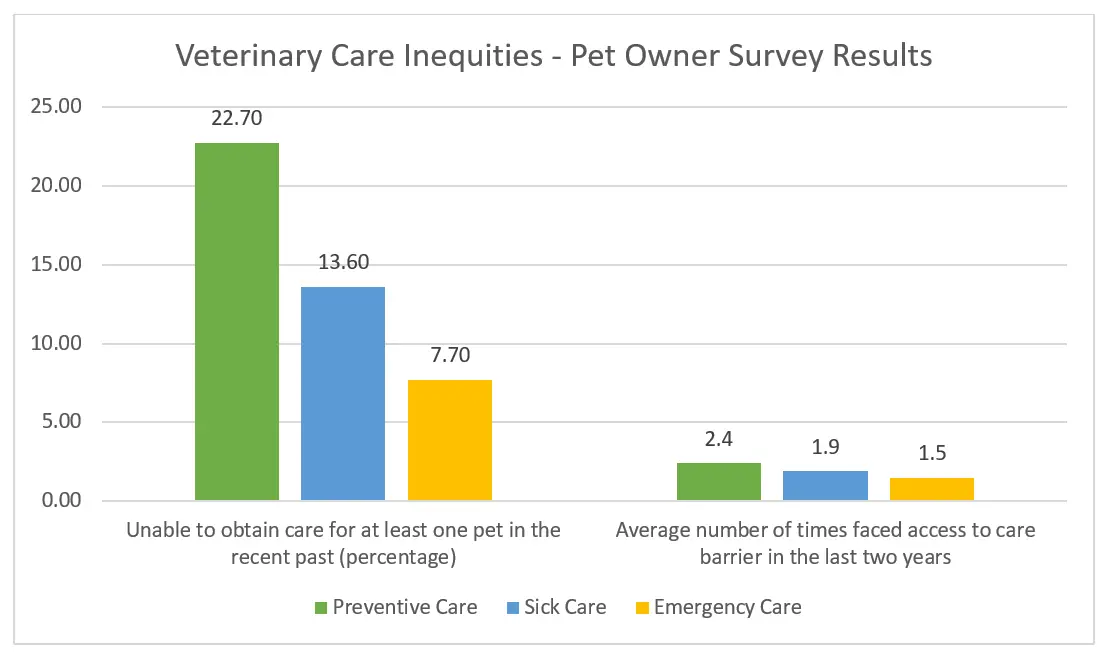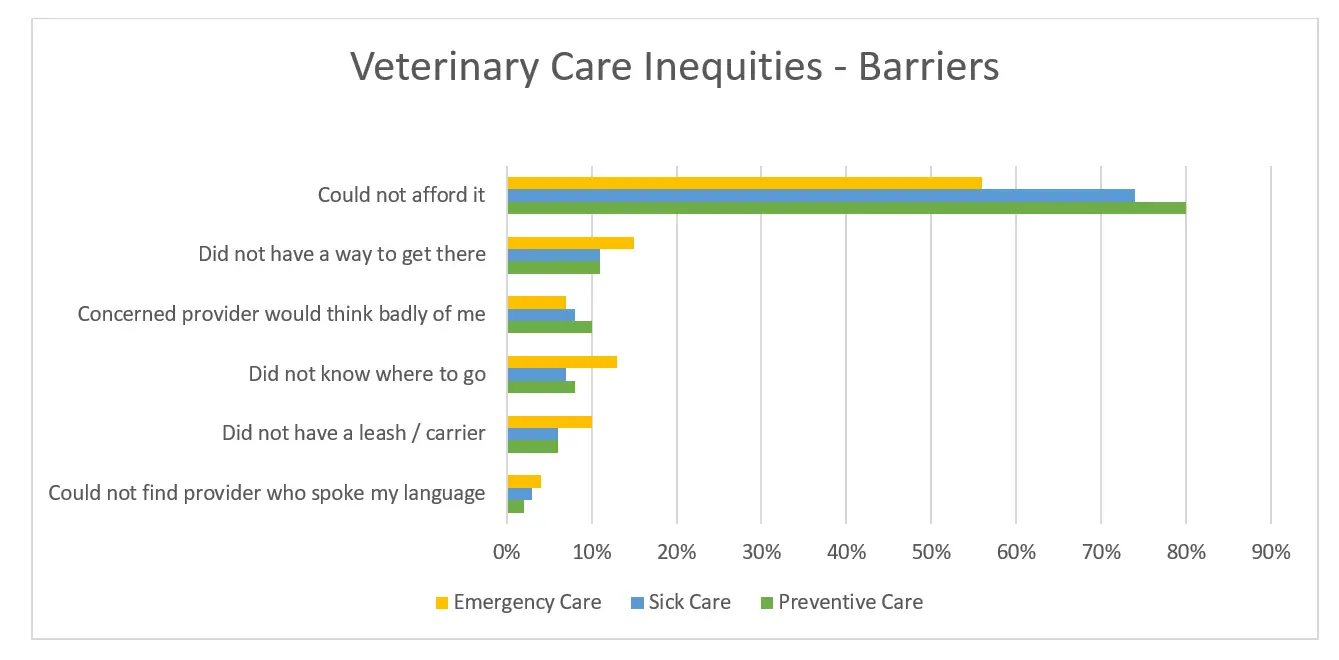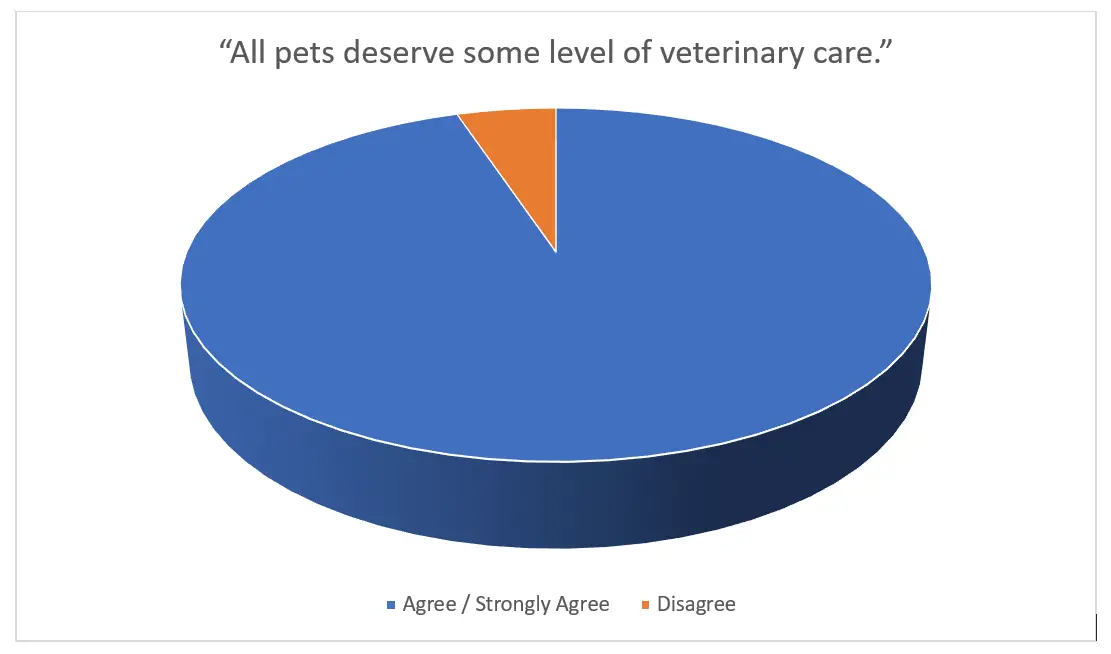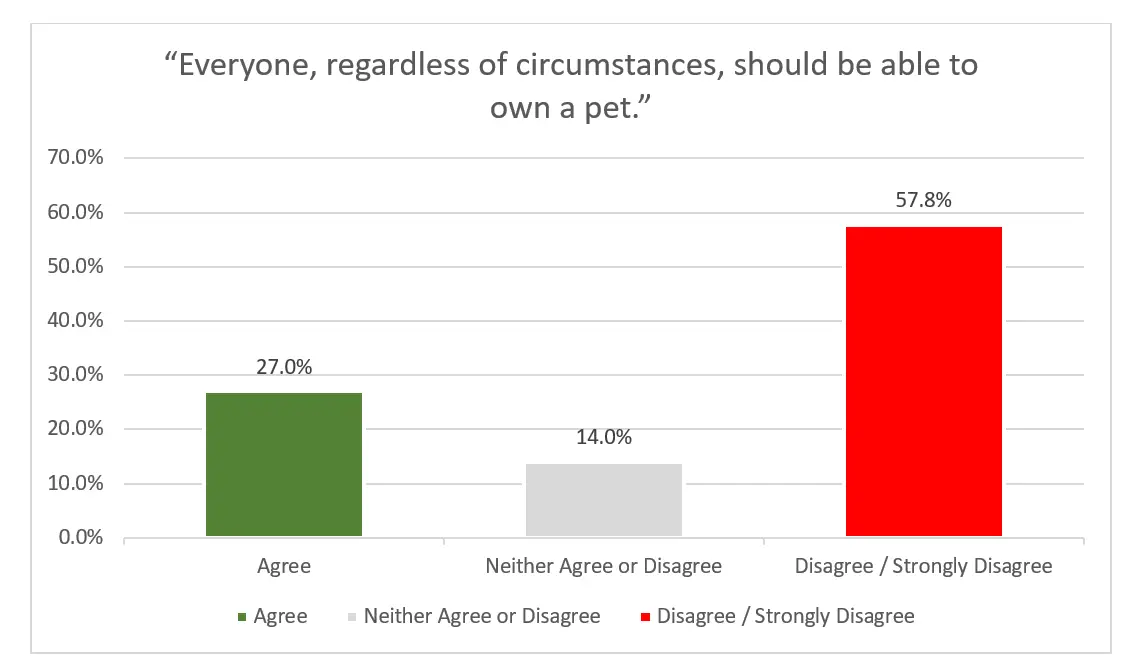I recently researched and wrote a lengthy article for veterinary professionals on veterinary care inequities. It's NOT YET published, but some important parts got axed in editing. It felt like an issue of fragility, if you understand that term. I argued (and lost). I feel that NOT sharing painful details about the problem only perpetuates inequities many people face when trying to access veterinary care for their pets. So, I alerted some of the people I interviewed about the editing cuts and got permission to share these key points here instead. Who isn't getting the veterinary care? How common are veterinary care inequities? What barriers do people face? What underlying biases preserve the problem? And, how does this bias and lack of access feel in real life? Let's take a look.
More...
Look for places I've marked as being edited out of my article on this topic. I included some of the rest for context.
Veterinary Care Inequities
Who isn't getting veterinary care?
The short answer is that the largest subset of pet lovers who don't have adequate or easy access to veterinary care are those formerly referred to as "the working poor." Michael Blackwell, DVM, MPH, FNAP, who chairs the Access to Veterinary Care Coalition, explained to me that the current term is ALICE, meaning asset limited income constrained employed. Not slackers. Not scammers. People working VERY hard to get by.
In 2018, the coalition published Access to Veterinary Care: Barriers, Current Practices, and Public Policy with a deep dive into the data and thoughtful consideration of the many elements the contribute to veterinary care inequities.
The report includes information about the sources of these pets in ALICE families, and in many cases, pets get taken in as strays and from friends and family members also struggling with low incomes, food and shelter insecurities, and medical issues. In other words, people with the least to spare generously open their homes to pets, which as Blackwell explained to me should be something we want in the world. It's important to understand that many of those facing veterinary care inequities get in over their heads, but NOT because they actively purchase or adopt pets through typical channels.
How common are veterinary care inequities?
Estimates based on inhouse data from PetSmart Charities peg the number of pets without adequate veterinary care top 50 million. That 2018 access report estimates that 29 million dogs and cats live with families enrolled in the Supplemental Nutrition Assistance Program (SNAP), which is just one indicator of need.
Pet owner surveys found that:
- 22.7% couldn't access preventive care
- 13.6% couldn't access sick pet scare
- 7.7% couldn't access emergency veterinary care
In addition, this happened more than once to families in 2 years:
- Preventive care - 2.4 times
- Sick pet care - 1.9 times
- Emergency veterinary care - 1.5 times
What barriers do people face?
By far, financial issues pose the greatest barrier to pets getting the veterinary care they need. The full list includes these reasons people face barriers and veterinary care inequities:
- Could not afford it
- Did not have a way to get there
- Concerned provider would think badly of me
- Did not know where to go
- Did not have a leash / carrier
- Could not find provider who spoke my language
[This next section includes information cut from my article.]
Veterinary Care Inequities
What underlying biases preserve the problem?
The veterinary access report included a survey for veterinarians. Among other things, it measured consensus with statements about rights and responsibilities around pet ownership. While 94.9 percent either agreed or strongly agreed with “All pets deserve some level of veterinary care,” consensus fell dramatically for the statement “Everyone, regardless of circumstances, should be able to own a pet.”
- Only 27 percent agreed
- About 14 percent neither agreed nor disagreed
- 57.8 percent disagreed (23.9 percent strongly disagreed), saying things in focus groups like “pets are not a right.”
You hear / see these same sentiments on social media and conversations around people struggling to afford veterinary care or facing other barriers, including transportation issues since public transit and even driver apps are NOT friendly to passengers with pets and even something as simple as not having collars, harnesses, leashes, or carriers to safely transport pets.
I follow a veterinary technician, also a comedian, who makes jokes about the kinds of makeshift carriers people show up with at veterinary hospitals. He even sells t-shirts about it. Now that I know more, I find it less funny.
Robyn Jaynes, DVM, director of veterinary affairs, PetSmart Charities, told me in an interview about how veterinary teams really need to learn to suspend judgement, including for people showing up with a cat in a pillow case. Remember, from above, "Concerned provider would think badly of me," showed up on the barriers list.
***
[This next section includes information cut from my article.]
Veterinary Care Inequities
How does this bias and lack of access feel in real life?
Often drawing on firsthand experience, Bobbi Dempsey writes about issues related to poverty and income inequality. She recalls living with a few pets in childhood, mostly cats, but dozens of moves made keeping them impossible.
Dempsey recognizes others’ judgements “that imply poor people who can’t afford vet care, just don’t care, are kind of oblivious, or unfeeling towards their pets, and it’s usually just the opposite.”
A few years ago, Dempsey’s late mother received a handwritten letter from a veterinary practice that Dempsey describes as “scolding” about overdue wellness services, including something to the effect of “If it’s not that important to you for your dog to come in, then maybe we’re not the right vet for you.”
That letter landed hard. Her mom lived in poverty, had just lost her husband, and was “literally taking up a collection to bury him,” Dempsey says.
Where Dempsey lives in rural northeastern Pennsylvania with high poverty rates help isn’t readily available. Just as food deserts exist in communities without grocery stores, people also experience veterinary deserts, where care options are limited or non-existent.
“I think a lot of people, especially from bigger areas, assume that there are all these rescues and charity organizations that help,” Dempsey says.
***
Veterinary Care Inequities
Possible solutions?
Later this year (2022), I look forward to reading the AlignCare pilot program report from Blackwell's Program for Pet Health Equity at the University of Tennessee, Knoxville, to see how their program worked in various in test cities. Maybe I can write more about this issue when that report comes out.
There's also a new hospital not far from me in Colorado -- Dumb Friends League Veterinary Hospital at CSU Spur -- that offers $150 flat-rate diagnostics and flat-rate treatment plans, without people having to prove need, which the league feels is another barrier.
Notice I'm not telling you about how big donors or foundations or other financial solutions afoot. That's because according to the folks I interviewed from PetSmart Charities, it would take $20-$23 billion per year to help all the pets not receiving adequate veterinary care, and that's not possible, even if you lumped every pet organization together.
Strong statement from the access report
The access report introduction includes this powerful statement about how big this issue really is. “Lack of access to veterinary care is a complex societal problem with multiple causes, with socioeconomic status being an important factor. Simply stated, millions of pets do not receive adequate veterinary care because the costs are beyond the family’s ability to pay. This may be the most significant animal welfare crisis affecting owned pets in the United States.”








Years back I volunteered with an organization that would bring a van into a neighborhood and offer nine dollar rabies shots and a few others vaccinations at similar pricing. No one was ever turned away due to lack of money. Plus we had a pet food bank. Unfortunately after a few years the organization stopped due to the founders being burnt out. No one wanted to take over.
What I learned was that even the poorest person loved their dog or cat. Sometimes it was lack of money or just not knowing. This is an urban neighborhood where kerosine was being put on dogs to kill fleas. After a while I learned not to judge people and help when I could.
There were things I saw that was heartbreaking. But I also saw trust build as word spread that we did not judge or shame.
It was only one day a month for a few years, but it definitely changed me as a person for the better.
Last year I had two dogs pass away within six months. The cost for their medical care was over seven thousand dollars. It just about broke me. But I would do it again.
And I’m sorry but there are those vets our there who will take advantage of people, like myself, and will keep you coming back again and again knowing full well that the dog or cat will NEVER be well. I just had this happen to me and now I am struggling to pay off credit cards because this vet ASSURED me that she could “heal” my dog. Guess what……he actually got worse while under her care. I realize that veterinarians have a lot of overhead but if they can’t heal the animal they should have the decency to let you know that. And NO, I will not start a GoFundMe to ask people for money. And YES, I do think that everybody should be able to have an animal no matter what their socioeconomic status might be. You are welcome to disagree with me but I have been forced to feel this way. I have been on an emotional roller coaster for years over this situation. It wasn’t fair to my dog or to me.
This is an eye opening article. I had no idea. Thanks for sharing it Roxanne.
I count being able to access/afford veterinary care for my dogs over the years as a huge blessing! Especially since, like you, I need dogs in my life. Even just feeding a dog – especially a larger breed – feels like a major expense sometimes.
Unfortunately, there are unsavory folks out there who try to take advantage by refusing to pay the bill for their pet’s care even though they can afford it. What’s worse is that when these same people get a reputation for their unsavory ways and find themselves unable to get care for their pets, they go on social media and berate the vets for refusing to care for their pets without first providing a credit card to bill to. Vet school and maintaining a practice are not inexpensive “ventures”, and veterinarians have to pay their bills like the rest of us. When faced with folks like I mentioned above, one can hardly blame veterinarians for being somewhat prejudiced against pet owners who can’t or just refuse to pay for the care. There are vets out there who are willing to work out a payment schedule for folks who have a hard time paying for their pets’ care. And that’s admirable; but they shouldn’t be subjected to libelous public comments for refusing care to pets whose owners consistently miss making the payments. I guess what I’m saying is that, yes, there are inequities in veterinary care; but veterinarians are people too and should not be subject to scorn and ridicule more so than are their human healthcare counterparts.